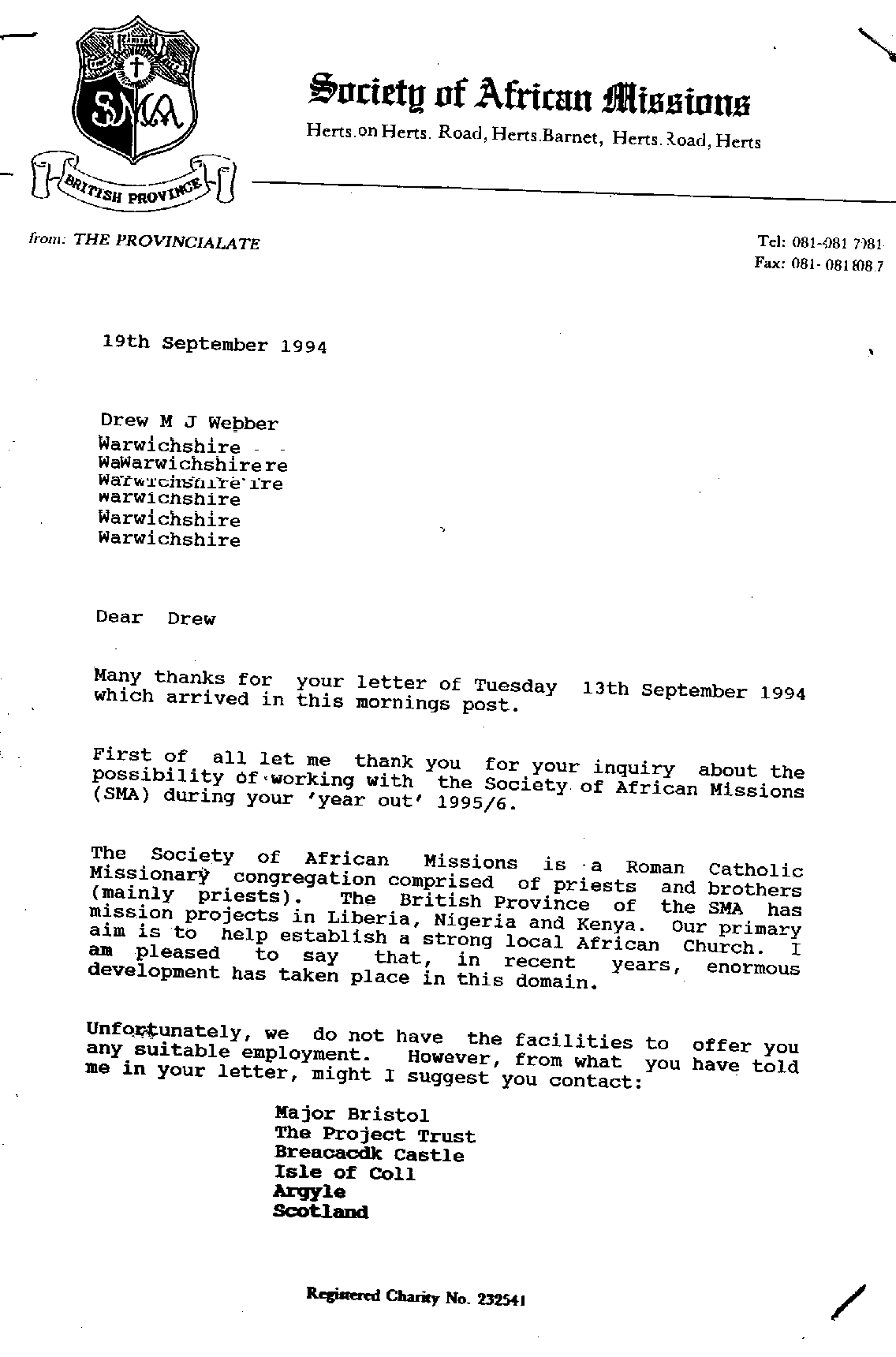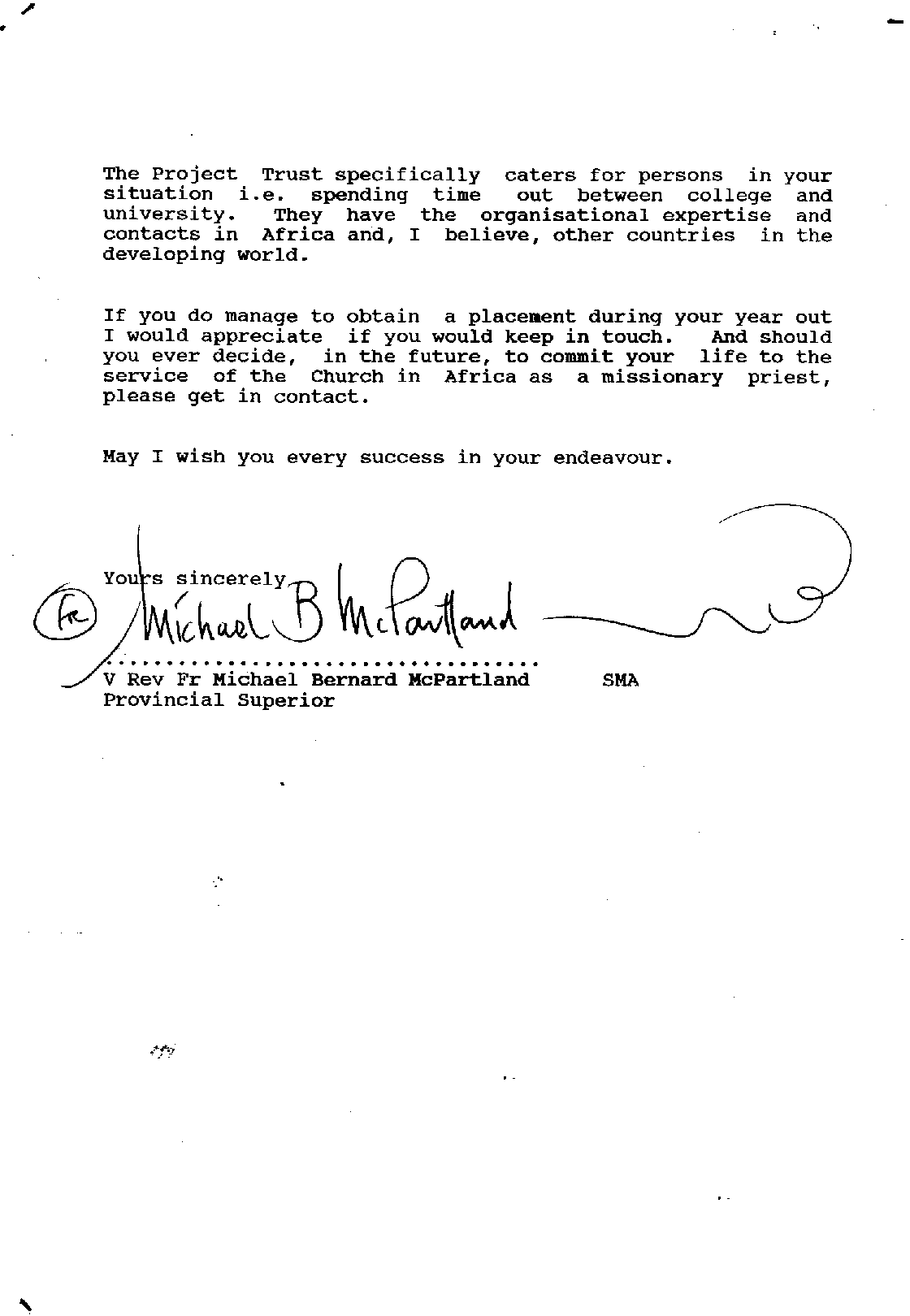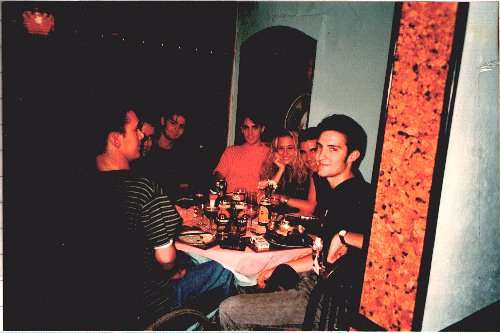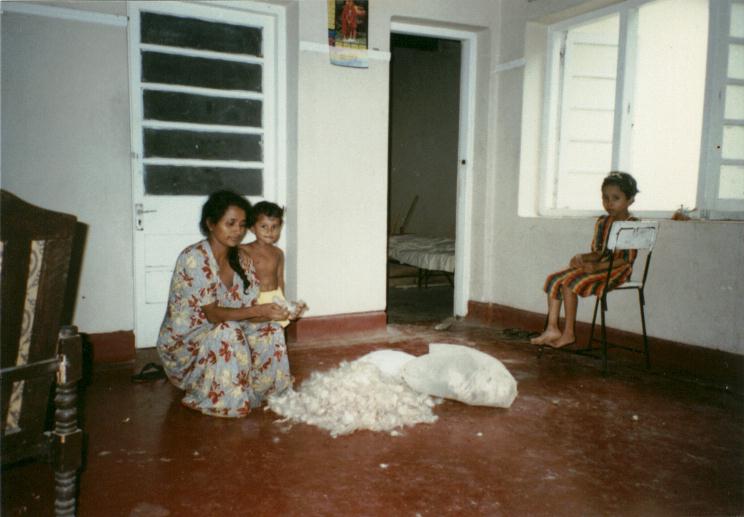Community Report - Pre-Departure
It is difficult to say exactly when I decided that I wanted to take a 'year out', but it was during my Lower and Upper 6th form years at school. My principal motivation was my interest in developing counties, which was fostered by my studies in Economics and Politics, and to some extent English Literature. I knew that I wanted to go on to study Economics, and particularly the political and developmental aspects of the subject at University.
I felt that if I were to spend a year working in a developing country, I would be in a better position to study them at University, having a background knowledge and understanding not provided by A-levels. I was interested in pursuing a career involving development, and a year overseas seemed like an obvious 'first step' in this direction.
I made enquiries into the possibility of spending a year in Africa, Asia or South America with various charities, writing a few hundred letters offering my services to anyone who could use them. I had never realised how many different way it was possible to say 'no'. It seemed like almost every day for a few months after I sent the letters, I would return home from school to find a handful of rejection letters.
From those letters which gave reasons for their 'inability to offer me a suitable placement', I gathered that the GCSE's, and A-levels I was soon to be leaving school with, were insufficient qualifications; most organisations, if they did offer short term overseas placements, did so to experienced medics, engineers and suchlike. Of the organisations such as VSO (Voluntary Service Overseas) and IVS (International Voluntary Service) which specialise in sending volunteers abroad, none offered a year placement suitable for my 'year out' plans.
I had decided not to apply to any of the groups which specifically cater for students venturing overseas. I suppose I had a mental picture of teenagers laden with outsized rucksacks, travelling across the globe in much the same way as some of my acquaintances had 'inter-railed around Europe'. This image, I associated with some of the 'gap filling' organisations. My father assured me that he would support me in my endeavours as long as I organised something 'structured'. This was a view I fully agreed with. I was not so much interested in an epic adventure, complete with copious soul-searching and self-enlightenment, as experiencing at first hand the workings of a developing economy. I think, in retrospect, that I had many misconceptions about 'studenty' schemes for 'year outs', but these were the reasons I was reticent to approach a specialist organisation.
After a few months of polite apologies, being punctuated by blunt refusals, arrived in our post box, it became increasingly clear to me that my somewhat romantic ideas of working with a charity in Africa were just that; romantic ideas that were not going to come to fruitition.
One day, I received the following letter from the V Rev Fr Michael Bernard McPartland, the Provincial Superior for the Society of African Missions, who had received one of my letters:


Letter from V Rev Fr Michael Bernard McPartland, the Provincial Superior for the Society of African Missions.
I wasn't entirely convinced about devoting my life to the priesthood in Africa. However, writing to the address for Project Trust sounded like a fairly prudent move.
The information I subsequently received about Project Trust somewhat made me reconsider the perceptions I had of such schemes. My family agreed that it looked suitable for my plans, and the negative responses from almost everyone else I had written to were still piling up, so I applied to become a Project Trust Volunteer.
In December 1994, I attended a Selection Course on the Hebredian Isle of Coll, where Project Trust's headquarters are situated. The location works well for the Selection Courses, as prospective volunteers are placed in an environment quite different to what most of them are used to, and simply observing their reactions to this constitutes part of the selection process itself. Hopeful volunteers are given simple tests to gauge their aptitudes in learning new languages, teaching, and other appropriate areas. It sometimes seems to candidates that the aim of the course is to see how much discomfort and annoyance they can be subjected to, before the characteristic selection course 'I am enjoying digging this peat bog in the rain!' smile cracks.
Selection was, broadly speaking, good fun. There was, however, a slightly eerie atmosphere at times, when it felt like we were under 24hr surveillance for the week. I went there immediately after some fairly intensive University interviews, and the more drawn-out selection process on Coll was a stark contrast to the 30 minute bursts of attempting to 'think on your feet' under grilling.
Despite my being unable to shut up about Economics for the duration of my selection course, having spent months preparing for the aforementioned interviews, I made some good friends from the group of twenty-five complete strangers I had found myself with on the ferry from Oban at the start of the week.
As we approached Coll, and saw the landscape through the ferry's window, there were a few unenthusiastic comments, such as 'it's a rock!'. As we left a week later, however, most of us had developed quite an affection for the small island, and its close-knit community. It felt like 'the experience' had begun, and we only had to hope that we would be selected, and it could continue.
A week after attending the course, I received notification that I had indeed been selected, and was most likely to be sent to Indonesia, Thailand or Sri Lanka as an English Teacher. So, out the atlas came, and I started finding out a little more about these countries. As with most Project Trust volunteers, I still had several months of my A-levels to complete, so it was a strange feeling to be told I was soon to be changing roles in the classroom, and teaching rather than studying
Project Trust volunteers are currently required to raise around £3000 to finance their year overseas. Different people reach this fundraising target in various different ways. I was very lucky to achieve the total by doing little more arduous than writing a lot of letters. I was awarded a few travel scholarships and bursaries by school and local organisations such as the Rotary Club, and several private firms donated. I was extremely fortunate to avoid many of the fundraising nightmares encountered by some colleagues.
After the A-level exams, in mid-July '95, I attended a Training Course run by Project Trust, returning once again to the Isle of Coll. I achieved the required total for fundraising, and had been told I was definitely going to Sri Lanka as an English teacher. The fact that I had done almost all of my fundraising expecting to go to Indonesia didn't seem to present any major problems.
One of the most nerve-wracking moments of the training course must surely be the announcement of the pairs of partners. Everyone is understandably a little nervous about finding out who they are going to live with for the next year. In the slightly tense atmosphere, I do not think many people get to know their partners particularly well in that one week, and my partner and I left at the end of the week not really knowing much about each other. We were both fairly sure, however, that we would get along alright with one-another.
The week on Coll included a crash course in TESOL (Teaching English to Speakers of Other Languages) and talks about the countries we were soon to depart for. There were also practical sessions on 'classroom management techniques', health and safety and other such preparations.
Training really brought home to us how close our departure was. For some time I had known the rough dates, and had talked to various people under various different circumstances about the year ahead, but returning from Coll, it seemed to sink in somewhat that I only had a few more weeks at home, then I was in for a very big change.
As it seems is virtually mandatory for the soon-to-depart Project Volunteers, I visited almost all living members of my family currently residing in the UK in the weeks betwixt Training and our departure. As the 'big day' approached, and we attempted to finalise the preparations, I seemed to have the same conversation again and again with different people. All Project Trust Volunteers seem to agree that no matter how many times you deliver the "I expect in the first few months, I'll be a little homesick... but I'm glad it's for a whole year" speech, it never really sinks in to your own mind what you are saying. However well you prepare yourself, it is still a bit of a shock to the system when the day actually arrives!
I went out for a last night in the pub with my friends on Friday 25th August '95. I drove into town, as I had no intention of drinking for two reasons; I wanted to have a clear head that evening to say my 'au revoirs' to everyone, and I had little desire to feel unwell in the morning, as I had an early start. As the clock ticked away, I became increasingly aware of how this was the last CD I'd listen to on my stereo before my return the next year, the last night I'd sleep in my bed, last time I would drive my mother's car etc.. The calls of "Goodbye Drew, see you next year..." as I left the pub that night still had a remarkably unreal ring to them though.

This meal was intended to prepare me for what was to come, a few days before our departure. A few cans of beer and a delicious chicken balti were little preparation for the culinary fare which awaited me, however!
Please see the Project Trust's website for up-to-date fundraising requirements. « back

